November marks an important month for veterans—a time to remind Canadians of the sacrifices made for the freedoms they enjoy.
Charlie Tatham, who celebrates his 89th birthday on Saturday, November 8, has tried for a number of years to give the men and women remembered in November 11th’s two-minute silence a face and a name. He has done this through his writing, which he has shared with newspapers in his hometown of Woodstock, Ontario and with the Powell River Peak.
Tatham’s letters to the editor are written in a plain unsentimental style and provide snapshots from his youth, a personal remembrance of friends one veteran lost in a war that began 75 years ago.
“They were all good guys, but they’re not here anymore,” said Tatham. “It’s good to remember, but it’s hard.”
Tatham joined the Royal Canadian Air Force in London, Ontario in May 1943 when he was 17 years old. He had spent two and a half years in the Oxford Rifles Reserve, and like many of his friends, wanted to sign up for the regular army but was told that he was too young. Soldiery was a part of his family. His father fought in World War I.
In 1944 Tatham received his pilot’s wings and a commission after completing his training at Camp Borden.
He remembers the feeling he had on the first day of training at Borden when he was told that out of the 60 men training, three would be lost to accidents.
“When that comment was made I looked around and thought ‘I’m going to be living,’” he said. “We lost two.”
After training at Borden, Tatham helped to teach gunnery crews at Number 10 Bombing and Gunnery School on Prince Edward Island.
“Our job was to take kids up...we were all kids,” he said.
Tatham and the school’s other instructors would put three potential gunners into one Bolingbroke aircraft. Each of the three had bullets painted a different colour. They would fire at a drogue which was a windsock-like target pulled by another plane flying close. When the exercise concluded, the instructors would count the number of holes in the drogue and what colour they were to see which gunner was most accurate, he said.
He was posted to England in 1945 and volunteered for service in the Pacific, but was in Canada during Victory over Japan (VJ) Day.
As he crossed the Atlantic in a transport ship packed with tight rows of soldiers’ hammocks, he thought about the risk of being torpedoed and sunk, a risk that many of his friends who volunteered for service in the Royal Canadian Navy put themselves at during the Battle of the Atlantic.
“You’d see the tankers go up and down [on the ocean swells] and water sloshing over them with a hospital ship beside them,” he said. “It sounds pretty wonderful, but it was pretty awful.”
Even though he was eager to contribute to the war effort and felt it was his duty to fight, he had mixed feelings about the affair, he said.
“It was a job that needed to be done and you had to do it,” he said. “It’s not very glamorous to be shot at, though. You had to defend yourself and to do that you had to take part, but anyone who thinks it was wonderful should try it.”
Sixty-nine years after the end of World War II, Tatham said that he feels more than ever it is important for Canadians to pay their respect for those soldiers who fought and died to protect the country.
“We should pay attention and recognize that a lot of young fellas got killed,” he said.
He has been happy to see the number of people attending Remembrance Day ceremonies in Powell River increase over the years.
This has also been the trend across the country, and while Canadians have never shied away from honouring Remembrance Day, there is growing interest in paying tribute to fallen soldiers. A 2012 Ipsos Reid poll found 30 per cent of respondents had formal plans to attend Remembrance Day ceremonies, up from only 16 per cent four years before. Eighty-two per cent of respondents said they would wear a poppy in the days prior to November 11.
“I think Remembrance Day has more importance now than for a while,” he said.
Explanations for the increased interest can possibly be attributed to shifting demographics in the country’s veterans or by the fact that the ranks of World War II and Korean War survivors are being swelled by the thousands of soldiers who fought as part of Canada’s mission in Afghanistan. “We have to pay attention, we have to look after our children and appreciate the freedoms we have.”
A trip to the Soviet Union in 1963 further drove that fact home for him, he said. He saw vast cemeteries outside Saint Petersburg with more than a half a million graves.
“It was awful,” he said. “How do you kill people like that. We don’t remember much.
“I guess I shouldn’t be that cynical but we should read our history and understand how fortunate we are to be free.”
Tatham broke his hip last April and has been healing, but his mobility has been reduced. Despite this, he told the Peak that he will attend the November 11 ceremony at Powell River’s cenotaph in a wheelchair.



